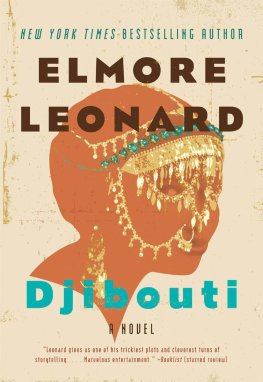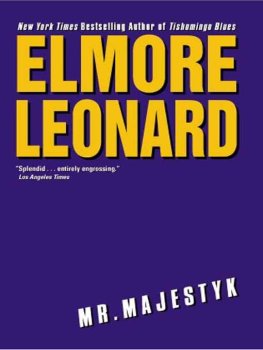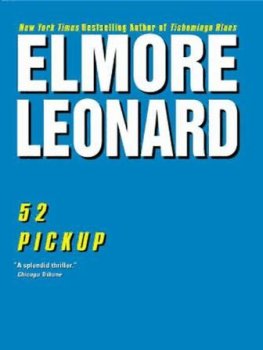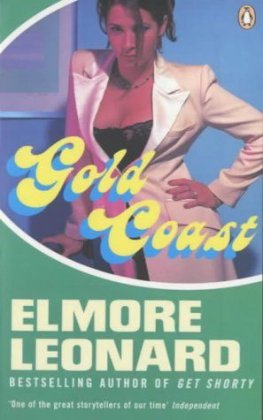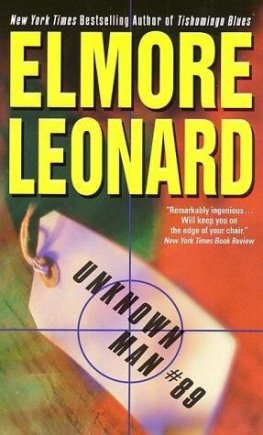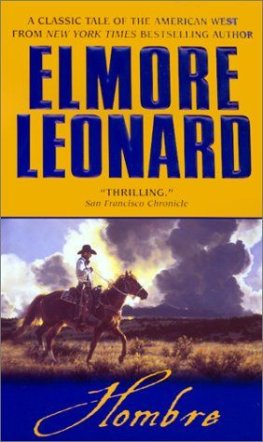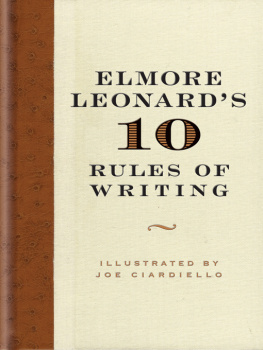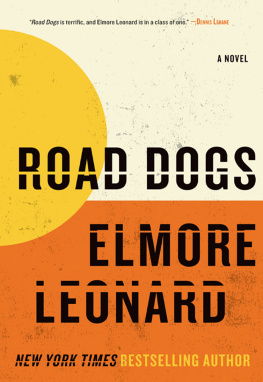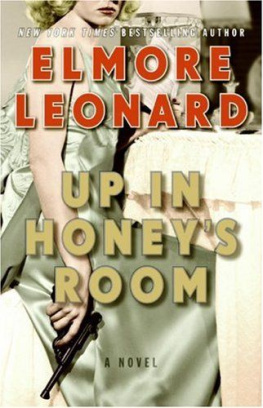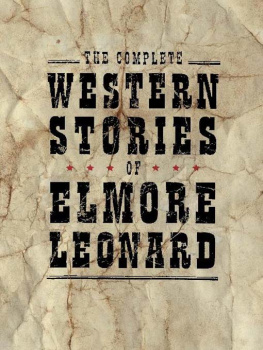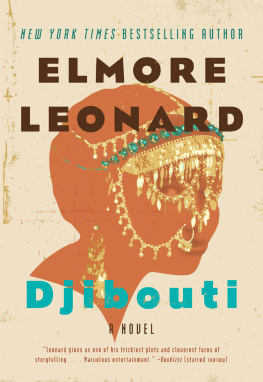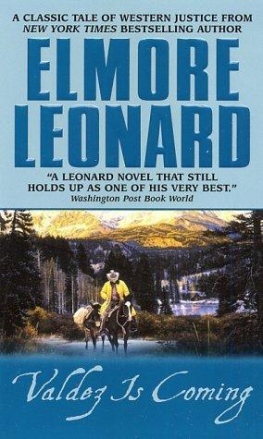Being Cool
BEING COOL
THE WORK OF
ELMORE LEONARD
CHARLES J. RZEPKA

2013 The Johns Hopkins University Press
All rights reserved. Published 2013
Printed in the United States of America on acid-free paper
2 4 6 8 9 7 5 3 1
The Johns Hopkins University Press
2715 North Charles Street
Baltimore, Maryland 21218-4363
www.press.jhu.edu
Library of Congress Cataloging-in-Publication Data
Rzepka, Charles J.
Being cool: The work of Elmore Leonard / Charles J. Rzepka.
pages cm
ISBN-13: 978-1-4214-1015-9 (hardcover : acid-free paper)
ISBN-13: 978-1-4214-1016-6 (electronic)
ISBN-10: 1-4214-1015-X (hardcover : acid-free paper)
ISBN-10: 1-4214-1016-8 (electronic)
1. Leonard, Elmore, 1925Authorship. 2. Leonard, Elmore, 1925Criticism
and interpretation. 3. Detective and mystery stories, AmericanHistory and
criticism. I. Title.
PS3562.E55Z85 2013
A catalog record for this book is available from the British Library.
Special discounts are available for bulk purchases of this book.
For more information, please contact Special Sales at 410-516-6936 or
specialsales@press.jhu.edu.
The Johns Hopkins University Press uses environmentally friendly book
materials, including recycled text paper that is composed of at least 30 percent
post-consumer waste, whenever possible.
CONTENTS
The images referenced in this text are unavailable for the e-book edition.
PREFACE
I first became interested in Elmore Leonard because I like to read crime fiction and Im originally from Detroit. It wasnt until I was working as an English professor in Boston, married with family, that a friend told me to read Swag. From the first page, I regretted the delay.
What hooked me almost instantly was Leonards sense of place. This was Detroit just as I had left it: crowded, dirty, parochial, demographically diverse, built up and boarded up, spread out and burned outnot for tourists. Like so many other readers from places other than the Motor City, however, I was also captivated by the Leonard sound, which means the sound of his characters: the curt backhands of their conversations, their compulsive storytelling, the trains of ragged thoughts muttering along in their heads. This was some writing. But decades had to pass and changes in my academic life had to happen before I had the opportunity to try explaining, in my own writing, what made Leonards so good.
Several years ago I coedited an anthology of essays on crime fiction, to which I contributed a piece on Elmore Leonard (Rzepka, Elmore Leonard, 1925). It crystallized for me a recurrent pattern in his workthe master-apprentice relationshipthat invited closer attention. It also emboldened me to contact Leonard to ask questions about his early life, his education, and his work habits that seemed crucial to animating this scarecrow of an idea. The result was several interviews comprising some twelve hours of recorded conversation. They form the core of this book.
I wrote Being Cool for three reasons: first, to say something significant about an important writer largely neglected by the academy, even by those knowledgeable in popular genres like crime and detection; second, in doing so, to persuade my colleagues that this writer should be neglected no longer. Leonard has been the subject of three brief literary biographies (Challens is best on the details of Leonards book and movie deals, Devlins and Geherins on literary influences and textual analysis), along with about a dozen scholarly essays and scores of interviews, reviews, and magazine articles. Being Cool is the first book-length study to pursue a single theme throughout Leonards work, and I hope it will inspire more. There is so much remaining to be done: on the character of the artist and the writer in his fiction; on his semi-autobiographical trilogy, The Hot Kid, Comfort to the Enemy, and Up in Honeys Room; on other outstanding novels treated cursorily here for lack of space, such as Freaky Deaky, one of Leonards personal favorites, or Get Shorty, his first meta-fiction; on how specific technologies of movie production, marketing, and viewing and their histories have affected his writing style, as well as on their representation in his work; on his use of costume and role-playing. I could go on. The first four interviews I conducted with Leonard, currently posted on the Crimeculture website ( www.crimeculture.com/?page_id=3435 ), run to nearly thirty-nine thousand words. Being Cool comes nowhere near mining their full potential.
Thirteen years ago, James Devlin felt obliged to defend Leonards status as a serious writer (12833). That debate is over. Admirers now include Martin Amis, Walker Percy, Ann Beattie, and former poet laureate Robert Pinsky. Saul Bellow was a fan (Amis 1), and Leonard has even been mentioned in the same breath as experimental writers like Pirandello, Calvino, Robbe-Grillet, Borges, and Nabokov (Grella 36). Both the topical reach of his work and the span of his career and canon are enormous: six decades, dozens of short stories, and forty-five novels, not to mention movies, screenplays, and televised versions of his writings. Space limitations forbid a close examination of the latter body of work here, but such artificial restrictions also offer certain advantages, allowing the contours of his stylistic experimentation and his evolving thematic concerns to emerge more clearly in the one medium over which he has exercised total control.
My third aim was to enhance the reading experience of the nonacademic Elmore Leonard fan. If Ive failed in the attempt, please blame me, not the critics and theorists I cite. Similarly, I take sole responsibility for any errors, factual or otherwise. Hopefully, they will incite readers to write more books and essays about Leonard to set the record straight.
In my work on this book I have benefited from the generosity of many individuals. Gregg Sutter, Leonards long-time researcher and assistant, spent hours fact-checking, provided helpful feedback, and laboriously scanned and uploaded images. He also compiled, copied, and sent the unpublished stories, along with other vital material and information. The authors first wife, Beverly Dekker, and their children, Jane Jones, Christopher Leonard, Peter Leonard, Bill Leonard, and Katie Dudley, all consented to phone interviews, and Jane and Chris provided personal photos. David Geherin, a pioneering Leonard scholar, read the manuscript of Being Cool and offered advice and encouragement, as did my colleagues Jonathan Mulrooney of Holy Cross and Bill Carroll of Boston University (Renaissance man by day and Leonard fan by night). To all of them I offer my heartfelt thanks. I also thank Bob Scheffler, research editor at Esquire magazine; Kristine Baclawski and the staff of the Michigan State University Library Special Collections; Danielle Kaltz and Linda Culpepper of the Detroit News; and Nanette OConnor and Veronique Tu of Campbell Ewald for providing images and information; and a special thanks to Joe and Cari Vaughn for Joes wonderful photograph of Leonard relaxing in his backyard, as well as to Lee Horsley for posting the Elmore Leonard interviews cited here on her Crimeculture website. Finally, this project could never have been completed without the help of the Boston University Center for the Humanities, which granted funds for travel expenses and interview transcriptions and provided crucial leave time to complete a first draft of the book by awarding me a Jeffrey Henderson Senior Fellowship.
Next page

